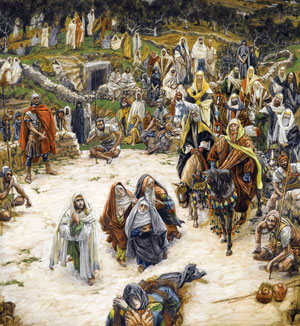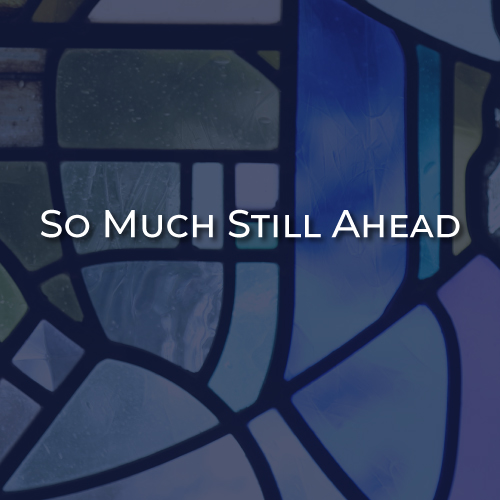Day 22
Posted on: March 10, 2024
by: Gerrit Dawson, Senior Pastor
by: Gerrit Dawson, Senior Pastor
WEEK 4
CRUCIFIED, DIED AND BURIED
 James Tissot. What Our Lord Saw from the Cross. 1890, Brooklyn Museum.
James Tissot. What Our Lord Saw from the Cross. 1890, Brooklyn Museum.
In stress, what’s deepest inside us is what comes out. Under immense spiritual pressure and in extreme physical agony, what emerges from the mouth of Christ are prayers from the Psalms. Squeeze Jesus and out come psalms. This week we linger at the cross. We will enter the rending passion of these horrible six hours. We’ll linger over the meaning of the psalms he quoted. We’ll contemplate where his spirit went on Good Friday and how the psalms of deepest lament might have prepared him.
This week’s painting by James Tissot gives us a unique perspective of the crucifixion in that it presents the scene from the viewpoint of Jesus on the cross. In effect, then, we are looking out through Jesus’ eyes down on the people who stand below him: the faithful lamenting women who loved him, the sneering religious officials, the bored but potent guards, and the mob who came for entertainment. The whole human panoply watches the Savior give his life for us. As we prepare to pray as Jesus prayed from the cross, take a moment to look and see what Jesus saw from his rough perch.
DAY 22 SUNDAY
Father Forgive Them
Imagine standing with Jesus, right next to him, in prayer to his Father. Read this passage of praise aloud. As you do so, consider that you are praying along with Jesus, your two voices becoming one as you bless God.
Bless the LORD, O my soul,
and all that is within me,
bless his holy name!
Bless the LORD, O my soul,
and forget not all his benefits,
who forgives all your iniquity
who heals all your diseases,
who redeems your life from the pit,
who crowns you with steadfast love and mercy,
who satisfies you with good
so that your youth is renewed like the eagle’s. (Psalm 103:1-5)
Psalm 51:1-4a, 9-15
Have mercy on me, O God,
according to your steadfast love;
according to your abundant mercy
blot out my transgressions.
Wash me thoroughly from my iniquity,
and cleanse me from my sin!
For I know my transgressions,
and my sin is ever before me.
Against you, you only, have I sinned
and done what is evil in your sight. . . .
Hide your face from my sins,
and blot out all my iniquities.
Create in me a clean heart, O God,
and renew a right spirit within me.
Cast me not away from your presence,
and take not your Holy Spirit from me.
Restore to me the joy of your salvation,
and uphold me with a willing spirit.
Then I will teach transgressors your ways,
and sinners will return to you.
Deliver me from bloodguiltiness, O God,
O God of my salvation,
and my tongue will sing aloud of your righteousness.
O Lord, open my lips,
What Is This Psalm About?
This is a prayer of raw confession followed by an earnest plea for forgiveness. The superscription identifies Psalm 51 as composed by David following his confrontation with the prophet Nathan. “You are the man!” declared Nathan as he exposed David’s affair with Bathsheba, the subsequent murder of her husband, and the weeks of cover-up. David, still the man after God’s own heart despite his grievous acts, broke wide open: “I have sinned against the LORD.” His psalm expresses the breach in our relationship with God which every sin, great or small, creates. He articulates just how much we have lost. He cries out for the restoration every heart craves. Accordingly, this song has been cherished across the centuries and cultures.
What Might This Psalm Have Meant to Jesus?
Following the sham trial, the authorities take Jesus to Pilate the Roman governor. Though Pilate wants to release Jesus, the religious authorities whip the crowd into a frenzy of shouting, “Crucify!” The governor relents and sentences Jesus to crucifixion.
The first of Jesus’ seven last sayings on the cross were recorded by Luke: “And when they came to the place that is called The Skull, there they crucified him, and the criminals, one on his right and one on his left. And Jesus said, ‘Father, forgive them, for they know not what they do’” (Luke 23:33-34).
Jesus does not deserve in any way to be there. He has committed no sin in thought or deed. But he does not rail against his torturers. He does not protest his innocence in bitterness and indignation. Rather, Jesus prays for the forgiveness of those who unjustly execute him. This in itself is remarkable. Who could be so other-focused in the midst of such suffering?
But there is more going on here from both the side of man and the side of God. On the human side of the crucifixion, the wrath of humanity which rebels against God has nailed Jesus to the killing tree. The Jewish and Roman officials have given expression to the rage in every heart. For the cross reveals the truth about us. We are by nature haters of God (Romans 1:30). Our default position is to be “lovers of self, lovers of money, proud, arrogant, abusive, disobedient to their parents, ungrateful, unholy, heartless, unappeasable, slanderous, without self-control, brutal, not loving good, treacherous, reckless, swollen with conceit, lovers of pleasure rather than lovers of God” (2 Timothy 3:2-4).
However, on the divine side, Jesus is on the cross by the eternal plan of the triune God. Now, by his own design, he also receives the wrath of God against all the distortion, crushing, consuming and twisting within humanity’s evil. There is a great, awe-inspiring mystery occurring. Paul describes this marvel in a succinct, powerful sentence: “For our sake he made him to be sin who knew no sin, so that in him we might become the righteousness of God” (2 Corinthians 5:21). It’s just that clear. Paul employs a straightforward word used more than 570 times in the New Testament. Poieo means to do or make. God did something. He made Jesus into sin. Jesus the sinless one became the essence of sin so that we the sinners might become the very righteousness of God.
This is the one who prays, “Father, forgive them.” In this moment Jesus is not being forgiven for sins he did not commit. Rather, he takes our sins as his own, accepting our guilt, and prays for our release from the burden of them. From the beginning, we have seen how Jesus identifies with sinful humanity. He stands with us—he stands in for us—supremely on the cross.
Just here, we can imagine Jesus, the sinless one, praying Psalm 51 on behalf of all sinners. That’s how much he identifies with us. More passionately than even the convicted and grievously guilty David, Jesus our spotless Lamb confesses sin and prays for forgiveness as one of us.
Take a minute now to read back through our excerpts from Psalm 51. Imagine Jesus on the cross, bearing our sin and confessing our sin as his own. Say the words aloud if you can, praying with Jesus as he prays for us.
Praying with Jesus
Jesus, you lead our worship
As our brother in the flesh.
I know that, but I tremble
To realize you confess sin
With me, for me, as me on the cross.
Have mercy on me a sinner!
You plead in my place
With an authentic contrition,
A perfect repentance,
And a pure desire to be restored
To the joy of salvation.
Cleanse me from my sin!
You pray even as you cleanse
The very sins of mine you confess
In the blood you shed on the tree.
Take not your Holy Spirit from me!
You pray as you give up your Spirit
So that passing through lonely death
You will be able to share your Spirit
With me when you are restored.
Oh, Lord Jesus, all this, all this
As you take the nails and the spite
And say, “Father forgive.”
Posted in:
Lent




 Close
Close









.jpg)

